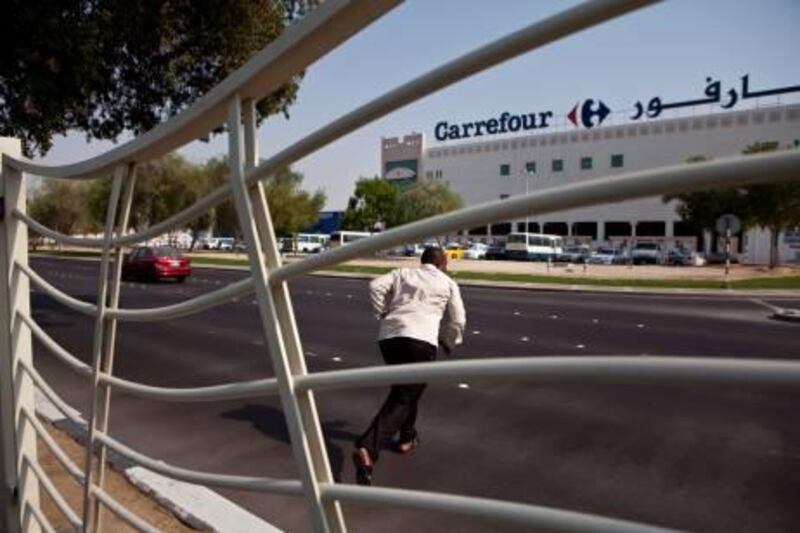ABU DHABI // The death of three young Emirati girls at the side of Airport Road two years ago today was an unspeakable tragedy.
Shaikha Salem Al Mansouri, four, and her sisters Damayer, six, and Mariam, seven, were attempting to cross to Carrefour when they were hit by a speeding driver. Their three nannies were hurt by the impact, with one, Nurshaida Parjan, 24, suffering brain injuries so severe she died in April of the following year after being moved back home to Indonesia.
THE ROAD TO SAFETY:
Teenager recalls horror of crash without seat belt Motorists agree that roads have become safer, however they also stressed the important role of education. Read article
Boys hit by school bus remain critical The families of two boys struck by a school bus were standing by them at the hospital as they recovered from their injuries. Read article
Race driver in gear for safer roads Haytham Sultan, an Emirati race car driver, says young men drive recklessly as a way to release their "passion". Read article
The 20-year-old male Emirati driver was jailed for six months and fined Dh5,000. Prosecutors said he had paid Dh300,000 in blood money to girls' parents.
The crash prompted outrage, predictably, but it also served as a wake-up call and a powerful catalyst for positive change - change reflected in statistics that show pedestrian fatalities and road deaths have dropped in Abu Dhabi and Dubai.
The day after the crash The National launched an ongoing Road to Safety campaign that continues to publicise issues and problem areas and push officials for better, more comprehensive policies. Traffic police stepped up measures to reduce dangerous behaviour by all road users, including motorists, pedestrians and cyclists.
Risky driving behaviour on the roads is leading to hefty penalties. Jaywalkers are being fined immediately.
And, according to a recent decision by the Ministry of Interior to link traffic fines to residency visas and Emirates ID cards, those who continue to speed face a growing variety of sanctions.
In Abu Dhabi, pedestrian fatalities dropped by nearly a quarter, with 65 during the first five months of this year compared with 86 during the same period last year. The number of pedestrian accidents has also dropped, with 219 until the end of May this year compared with 246 during the first five months last year.
In Dubai, pedestrian fatalities are at their lowest for at least a decade following an intense safety awareness campaign in the emirate. During the first quarter of this year there were 11 deaths compared with 17 during the same period last year, a 35 per cent drop. The Road and Transport Authority (RTA) credits the record low to numerous campaigns its Traffic and Roads Agency has conducted, as well as to the construction of numerous pedestrian bridges.
"The Traffic & Roads Agency has identified over the past two years seven areas that witnessed recurrent run-over accidents in certain areas such as Al Qouz, Al Wasl, and the service road of Sheikh Zayed Road," said Hussain Al Banna, the director of Traffic at the RTA's Traffic & Roads Agency. "The run-over statistics during the first quarter of this year reported no fatalities occurring in the identified areas, but were spread out over different areas."
Road crashes across the country have also declined, with an average of 525 per month, compared with about 600 per month the first half of last year.
The Abu Dhabi traffic police are working closely with the Ministry of Education and the Abu Dhabi Tourism Authority for a road safety summer campaign targeting students, tourists and residents. They are also working with the Ministry of Interior for a three-month campaign that will focus on safe driving on motorways.
"This is a region-wide issue, so we're not stopping at Abu Dhabi," said Col Jamal al Ameri, head of public relations at the Abu Dhabi Traffic and Patrols Directorate. "The campaign will run across the UAE and the GCC."
Meanwhile, awareness campaigns across both emirates have urged all pedestrians to use the designated crossings and be attentive and check for traffic before crossing the street.
However, some pedestrians still continue to take the risk. A study by the Department of Transport (DoT) found that 60 per cent of pedestrians in Abu Dhabi do not use designated crossings because they are inconveniently out of the way. About 30 per cent said the crossings take too long to use. According to figures from the Abu Dhabi traffic police, 78 per cent of the 590 pedestrian accidents in 2010 occurred where there were no pedestrian crossings.
Abu Dhabi traffic police is joining up with the DoT and Abu Dhabi Municipality to build nine new bridges across the emirate in black spot areas. One of the new bridges will be near Carrefour on Airport Road, where the three girls were killed.
The DoT is also working on a pedestrian and bikeway master plan, which aims to build and improve walking and cycling routes across the emirate. The planning process is expected to be completed next May.
In Dubai, the biggest contributor to the drastic reduction in pedestrian fatalities was the construction of 56 pedestrian bridges.
These included pedestrian bridges linking with Metro stations together with surface crossing points and speed reduction means.
[ mismail@thenational.ae ]
[ ealghalib@thenational.ae ]






